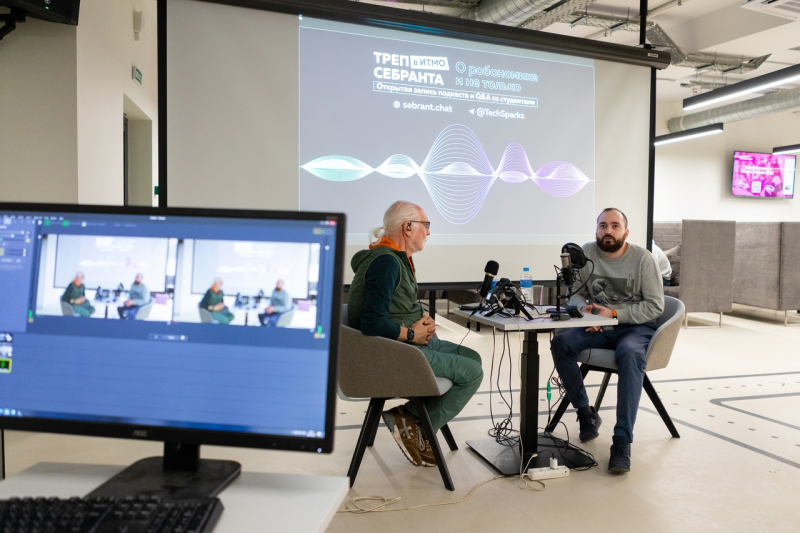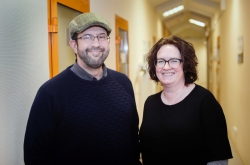On podcasts and “progressorship”
– This isn’t the first podcast you’ve worked on with ITMO; in the past couple of years, you’ve often approached our university, in some way or another. Why?
– I really like how ITMO organizes all kinds of interactions with various artists and makers. This is something unusual for a technical university. And this is an interesting topic to talk about.
Last June, I made an episode, and I don’t even know whether to say it’s about ITMO or the Hermitage. I recorded it with Dimitri Ozerkov, who’s known as a person from the world of art and major museums. At the same time, Dimitri is a staff member at ITMO and works at the intersection of art, science communication, and exact sciences (Dimitri Ozerkov is the head of the Department of Contemporary Art at the Hermitage Museum and also a professor and the head of the Art&Science Master’s program at ITMO – Ed.).
– You’re saying working at the intersection of various fields is important. Why?
– Because our world is changing rapidly and at a growing pace. I believe the only way to fit into this world is to be continuously learning new things, to always be ready for unexpected and unconventional changes in both your own fate and the general state of things in the world.
Classical science isn’t really good at teaching things like that, especially the conventional engineering approaches. This troubles me – the current “engineering approach” presumes that a person learns what’s in the textbooks and then creates similar things for the rest of their life. This doesn’t fit even the contemporary reality, much less the future.
So I find it very interesting how such a tradition-bound and rigid thing as the system of higher education tries to keep pace with the rapidly-changing reality, the interdisciplinary approach being one of the ways of doing it.
– What will you be talking with Alexandr Kapitonov about?
– I’m interested in how Aleksandr identifies himself. He calls himself “a progressor.” I’ve read a lot of Arkady and Boris Strugatsky (famous Soviet-Russian science fiction authors – Ed.), who came up with this word; and as far as I remember, a progressor is someone from a highly developed civilization who, so to say, endeavors to pull up underdeveloped civilizations to their level. This is an interesting role, and I’m curious to talk about it.
On the whole, I mostly improvise when I do my podcast. Sure enough, I prefer to research my guests a little bit before the talk if I don’t know them well enough. But save for that, I don’t have a plan – this makes the talk livelier. Much like a common conversation: you meet an interesting person, and you’re curious to talk to them. You don’t come up with some strategy for that, do you?
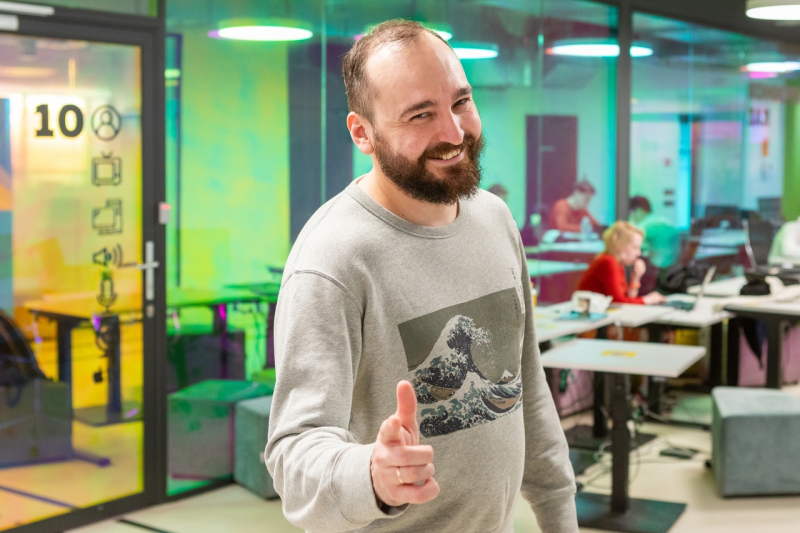
– And why did you decide to start doing podcasts in the first place? This also seems like some kind of “progressorship”.
Damned if I know. At some point, people around me started doing that, I got invited to various podcasts, and I often got bored. They asked me obvious questions like “when will robots enslave humanity?” or “how would Yandex’s driverless cars solve the trolley problem?”
At first it was fun, then I became annoyed with it. When I understood that it won’t be getting better, I got the notion that if I wanted to talk about something, I should do it myself. So I decided that I needed a podcast of my own.
What’s more, I understood that you don’t need an expensive studio to record a podcast – that’s overkill. All I have with me in my backpack is a recorder and a couple of microphones. If the conversation is worthwhile, you don’t exactly need a professional to record and process it. It’s the same as with photography – you can make good pictures with a smartphone, you don’t necessarily need an expensive camera and lots of various lenses.
On progress and society
– Let’s discuss the topics you usually cover in your podcast. I’ve listened to the episode where you predicted the things that will disappear in the coming twenty years. For one, you spoke about keyrings. But I want to ask a more global question. In your opinion, how exactly are technologies changing the world? Not some particulars, but what changes in the very structure of our world? What are the conceptually new things that technology brings to us?
– Transparency, I guess. Today, you can speak about something that’s important to not just you and your close ones, but millions of your subscribers. And it’s everyone who has this opportunity. That might sound pretentious, but we are witnessing a redistribution of power. It used to be that what we listened to, read, watched was determined by the media. It acted as a clerk who kept doors open to some and closed to others. But then Trump comes along, gets a Twitter account, and all those people are no longer important. They stand at the door, but there are no longer any walls around.
This happens to not just the fourth estate. One of the key instruments of any government is its central bank. Financial policy is something that a state would never give up, but cryptocurrencies are starting to infringe on it. The question is whether they’ll succeed. I don’t think they will, but watching this struggle is very interesting.
– When I listened to one of your episodes, I was intrigued by the notion that modern tech will help get rid of minor ineffective managers who only know how to monitor the work of others. As a historian, I can say that there were lots of technological revolutions, from the invention of the wheel to the information revolution. The society changed, but supervisors still stayed. Why do you think that everything will go differently this time, and the changes in the society won’t roll back?
– I think society has never rolled back. It always changed. This is why I’m amused bypeople who push for protecting the values of liberal democracy that are threatened by cases like when Trump “hacked” the information distribution system.
This sounds a lot like what I heard back at the Marx–Engels–Lenin Institute in USSR, where they said that communism is the pinnacle of human development and once it’s reached, there won’t be any substantial progress, only small improvements. I doubt there really are any pinnacles. So it’s interesting that people who are so pleased that they’ve dealt with communism say the very same spells with the very same intonation.
I’ve been at several Western conferences where respected local intellectuals said that we have to muster all our powers to stop the development of things like Facebook, Google, and programming in general. They say that if we won’t stop them, our society will change forever. Well, they are right – our society will change. They don’t want that. They want to keep our society as it is at any price, regardless of the fact that it no longer fits the current stage of the economy. And we don’t know what will happen next. No thinkers of the time of feudalism would’ve managed to describe how developed capitalism looks like.
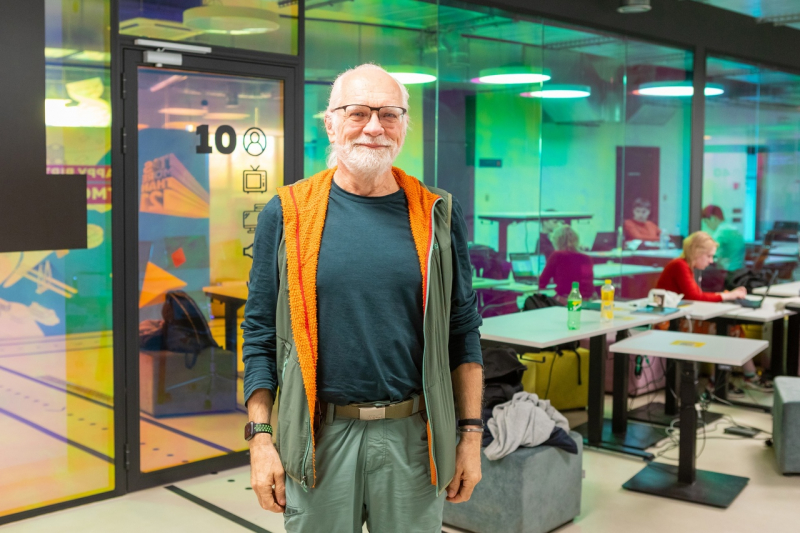
– But there’s a lot of criticism towards technology, people speak of a new Luddism. People say that every new app that lets us order delivery eliminates ten food stalls in our vicinity. What do you think – will we like the world that technology builds for us?
– This is just a repetition of what they’ve been telling us for hundreds of years. Before, 80% of the population fed their country. This was their ethical part and a way to make a living. But then the new technology-based agriculture replaced the small peasant plots, and now peasants no longer amount to 80% of the population. In the developed countries, they are less than 10%. And they don’t just feed the nation, but even export their produce to others. And there was no moral catastrophe.
Sure, some hit the bottle because horses got replaced by machines. What’s more, I’m sure that people who came to cities from villages started to live richer and more interesting lives than those of their ancestors who ploughed the earth on a daily basis.
The story repeats itself. Some people will lose their small shops. But that won’t happen in an instance. And their children might well think of such a way of trading as we think about the necessity to rise at the crack of dawn and plough from their childhood to the moment they die.
On education and startups
– You are a lecturer at the Higher School of Economics, so I can’t help but ask: many believe that higher education doesn’t meet the demands of industry – a person who comes to work at a plant after getting their education knows nothing and has to be taught from scratch. Is it so in the IT field?
– On the whole – yes, but with IT, it’s a bit easier, as IT graduates have the chance to acquire actual work experience in IT when they are still university or even school students. It’s easier for them in comparison with engineers who come in contact with huge machinery at plants only after they graduate.
– Is there any systemic way to breach this gap?
We need to teach them differently. But the thing is, as long as a university is economically sound, there’s no need to change anything. Only when alternative training methods start “intercepting” potential students and a university’s “food reserve” diminishes will global change take place.
– But there are many universities that change: ITMO, the Higher School of Economics, the European University...
– Yes, they change the content. One of the most important changes, as I see it, is the “startup as a thesis” program, when instead of making a student write a thesis, a university can say: “We see you have a great project in the field you pursue. Let’s say it’s your thesis because you’ve already shown that you can solve practical tasks.” This is something good, but it still doesn’t give a chance to assess students and give them credit in some particular subjects.
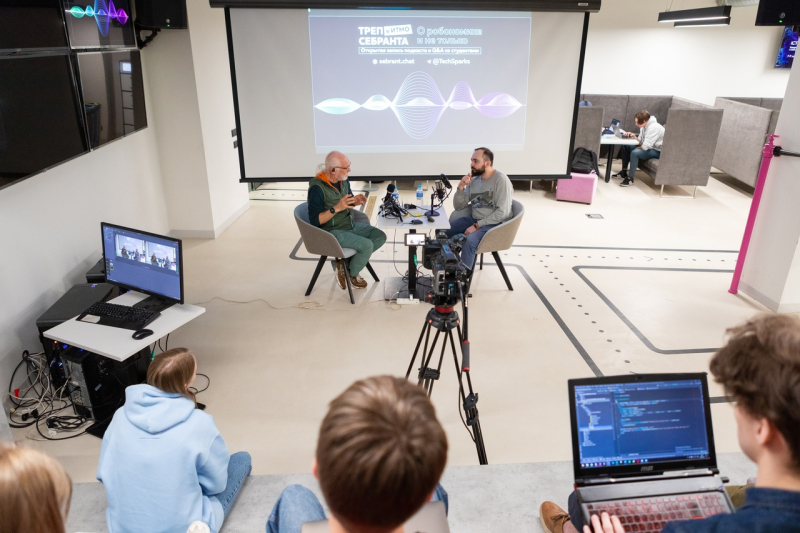
– You are among the “patriarchs” of our IT sector. You remember the world before Yandex. In this sense, I want to ask you: how has the startup world changed since then? Did it change for the better or for the worse?
– As always, there’s no simple black-and-white answer. For one, I don’t really like what has happened to startups, because for the most part, a startup has now become a financial rather than a technological project.
It is a powerful financial instrument in a time when a vast amount of money has left the stock market and gone from traditional banking into venture investments. Numerous startups are now created only with the purpose of returning money to their investors or increasing the capitalization of foundations that invest in them. In the earlier stages, there was no such thing.
A startup was deemed a way of self-fulfillment for enthusiasts who sometimes couldn’t even find financing. A lot of things depended on individual angels who seemed more like philanthropists than investors. This situation changed dramatically. Now, startups are all about finance.
– And there’s no longer a place for romance?
– No, there’s no longer a place for sense. When a startup becomes a purely financial instrument and doesn’t solve any user task, the world doesn’t become any better, or the people – happier, and so there’s no longer any sense in it.
Then again, we now witness an interesting change when new startups emerge – those that don’t sell themselves to foundations, when new instruments appear that help founders keep their companies to themselves after they enter the market, much like Yandex did it in its time.
– One final question: what are the chances that we’ll get to see you here at ITMO again soon?
– I don’t know, I often come to St. Petersburg. I’ll surely be here for the St. Petersburg International Economic Forum. So you very well might.
